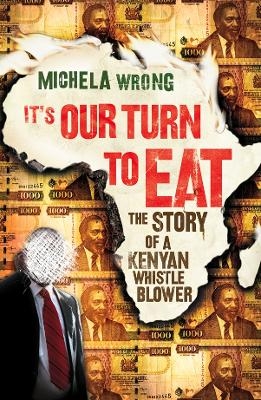
It’s Our Turn to Eat
Seiten
2009
Fourth Estate Ltd (Verlag)
978-0-00-724196-5 (ISBN)
Fourth Estate Ltd (Verlag)
978-0-00-724196-5 (ISBN)
- Titel ist leider vergriffen;
keine Neuauflage - Artikel merken
A gripping account of both an individual caught on the horns of an excruciating moral dilemma and a continent at a turning point.
When Michela Wrong's Kenyan friend John Githongo appeared one cold February morning on the doorstep of her London flat, carrying a small mountain of luggage and four trilling mobile phones he seemed determined to ignore, it was clear something had gone very wrong in a country regarded until then as one of Africa's few budding success stories.
Two years earlier, in the wave of euphoria that followed the election defeat of long-serving President Daniel arap Moi, John had been appointed Kenya's new anti-corruption czar. In choosing this giant of a man with a booming laugh, respected as a longstanding anti-corruption crusader, the new government was signalling to both its own public and the world at large that it was set on ending the practices that had made Kenya an international by-word for sleaze.
Now John was on the run, having realised that the new administration, far from breaking with the past, was using near-identical techniques to pilfer public funds. John's tale, which has all the elements of the political thriller, is the story of how a brave man came to make a lonely decision with huge ramifications. But his story transcends the personal, touching as it does on the cultural, historical and social themes that lie at the heart of the continent's continuing crisis.
Tracking this story of an African whistleblower who started out as a pillar of the establishment, Michela Wrong seeks answers to the questions that have puzzled outsiders for decades. What is it about African society that makes corruption so hard to eradicate, so sweeping in its scope, so destructive in its impact? Why have so many African presidents found it so easy to reduce all political discussion to the self-serving calculation of which tribe gets to "eat"? And at what stage will Africans start placing the wider interests of their nation ahead of the narrow interests of their tribe?
When Michela Wrong's Kenyan friend John Githongo appeared one cold February morning on the doorstep of her London flat, carrying a small mountain of luggage and four trilling mobile phones he seemed determined to ignore, it was clear something had gone very wrong in a country regarded until then as one of Africa's few budding success stories.
Two years earlier, in the wave of euphoria that followed the election defeat of long-serving President Daniel arap Moi, John had been appointed Kenya's new anti-corruption czar. In choosing this giant of a man with a booming laugh, respected as a longstanding anti-corruption crusader, the new government was signalling to both its own public and the world at large that it was set on ending the practices that had made Kenya an international by-word for sleaze.
Now John was on the run, having realised that the new administration, far from breaking with the past, was using near-identical techniques to pilfer public funds. John's tale, which has all the elements of the political thriller, is the story of how a brave man came to make a lonely decision with huge ramifications. But his story transcends the personal, touching as it does on the cultural, historical and social themes that lie at the heart of the continent's continuing crisis.
Tracking this story of an African whistleblower who started out as a pillar of the establishment, Michela Wrong seeks answers to the questions that have puzzled outsiders for decades. What is it about African society that makes corruption so hard to eradicate, so sweeping in its scope, so destructive in its impact? Why have so many African presidents found it so easy to reduce all political discussion to the self-serving calculation of which tribe gets to "eat"? And at what stage will Africans start placing the wider interests of their nation ahead of the narrow interests of their tribe?
Michela Wrong is a distinguished international journalist, and has worked as a foreign correspondent covering events across the African continent for Reuters, the BBC and the Financial Times. Based on her experiences in Africa, In the Footsteps of Mr Kurtz, her first book, won the PEN James Sterne Prize for non-fiction. I Didnt Do It for You focuses on the African nation of Eritrea.
| Erscheint lt. Verlag | 19.2.2009 |
|---|---|
| Verlagsort | London |
| Sprache | englisch |
| Maße | 153 x 234 mm |
| Gewicht | 475 g |
| Themenwelt | Sachbuch/Ratgeber ► Essen / Trinken ► Allgemeines / Lexika / Tabellen |
| Geschichte ► Allgemeine Geschichte ► Neuzeit (bis 1918) | |
| Geisteswissenschaften ► Geschichte ► Regional- / Ländergeschichte | |
| Sozialwissenschaften ► Politik / Verwaltung | |
| ISBN-10 | 0-00-724196-8 / 0007241968 |
| ISBN-13 | 978-0-00-724196-5 / 9780007241965 |
| Zustand | Neuware |
| Haben Sie eine Frage zum Produkt? |
Mehr entdecken
aus dem Bereich
aus dem Bereich
Europa 1848/49 und der Kampf für eine neue Welt
Buch | Hardcover (2023)
DVA (Verlag)
48,00 €
Giordano Bruno - ein ketzerisches Leben
Buch | Hardcover (2024)
C.H.Beck (Verlag)
29,90 €


